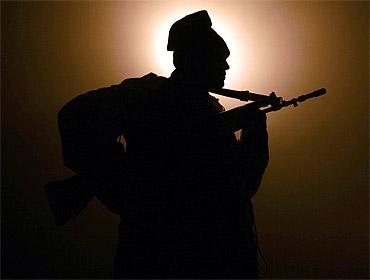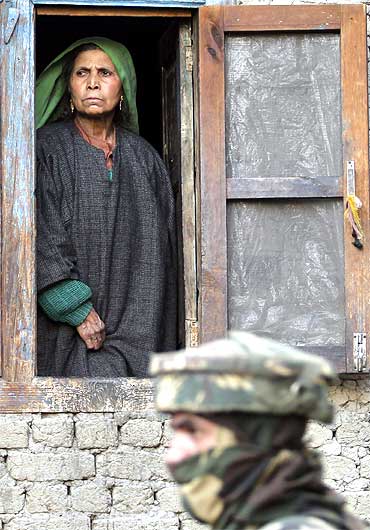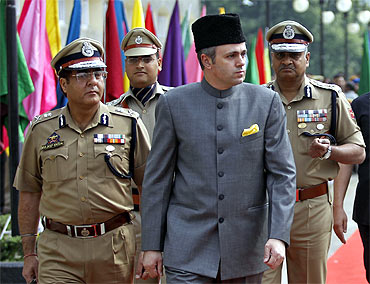 | « Back to article | Print this article |
'It is a complete political failure'
In the first part of this interview with Bula Devi, former home secretary G K Pillai had talked about why the Armed Forces Special Powers Act need not be repealed immediately but the Disturbed Areas Act should be lifted in Kashmir.
Part I: 'In Kashmir, everybody wants the status quo to continue'
In the second and final part of the interview, he explains that no one wants to take a risk or bite the proverbial bullet in Kashmir, fearing that the situation might implode again.
Once the AFSPA is imposed, it applies and protects all agencies -- CRPF, BSF, army, Assam Rifles etc. Why is it that only the army and the Assam Rifles are opposed to it? Is it because the CRPF and the BSF come under the home ministry and it has been in favour of lifting AFSPA from certain areas?
Yes, the army comes under the purview of the defence ministry while the CRPF and the BSF fall under the home ministry. My own feeling is that an elected government should take the decision whether the area is still disturbed or not.
Has it been a political failure that the AFSPA was allowed to continue in a place for so long?
Yes, of course, it is a complete political failure. You can check the graph of violent incidents and casualties when the act was brought in and the situation today. The killing has come down to 10 per cent of what it was when the Disturbed Areas Act was imposed. But the area still remains disturbed.
Why doesn't the government just say that the Disturbed Areas Act was notified when 100 people were killed and 1,000 incidents took place but now it is only 20 incidents and five killed? So, the basic political decision the government has to take is whether an area is not as disturbed as it used to be. Secondly, they have to see whether they can, without the army, manage the situation with better trained, better equipped police. If both the answers are yes then they should remove the Disturbed Areas Act. That is the decision they (government) are not taking.
CLICK on NEXT for more...
'Ministry of defence still hasn't given sanction in Pathribal case'
Why?
It is all political. If one goes purely by the facts, Nagaland should not remain under the Disturbed Area Act but nobody is willing to take a stand.
I think it is public perception also that if the act is removed from a particular place, AFSPA still continues. In that case repeal the act but put it in the Unlawful Activities (Prevention) Act.
But is it correct to impose the same harsh laws in some other act?
No, put it in a different way and don't have provisions to the extent of causing death. There are different ways of doing things such as in the case of corruption, where the act is being amended, if an application for sanction for prosecution has come and if you don't respond within 30 days it will be deemed sanctioned. If you say no, then you have to give reasons in writing which becomes justiciable and one can go to court.
Have similar provisions here. In the Pathribal case, the army -- meaning the ministry of defence -- still hasn't given its sanction. Then they should say we are not giving sanction because the army personnel were innocent. In that case, the people can go to court. But the army will neither give this nor that.
CLICK on NEXT for more...
'AFSPA should not be repealed'
When the Guwahati high court as well as the Supreme Court have upheld the AFSPA, then what is the way out?
The constitutional validity was upheld because courts are a little bit pro-government when it comes to national security and it involves secession, Pakistan, Jammu and Kashmir. But courts put down very clear cut dos and don'ts. For instance, they said the army can arrest but cannot interrogate because interrogation is the prerogative of the police.
They said hand them over to the police as soon as possible, within 24 hours, etc. So many killings and so-called torture will not happen if the army hands them over quickly. But the army keeps them for two-three days and violates the Supreme Court direction. There are many other dos and don'ts. That is why all these incidents like Malom, where 10 people standing at the bus stand, were fired at and killed (happen).
If one carries out genuine terrorist action and somebody gets killed, where is the protest? Terrorists fire at you, you fire back; you conduct a raid in a hideout, terrorist shoots at you and you shoot back, where is the protest? Mischiefs do happen. But I would say that in 90 per cent of the cases, people protest when they feel that something unjust has taken place.
So where the Disturbed Areas Act is removed, AFSPA also is automatically lifted?
My point is the AFSPA should not be repealed but the Disturbed Areas Act should go if the situation improves in a particular area. The act is needed. It is required because suppose tomorrow I need the army, I cannot go back to Parliament and get an ordinance issued. By then it will be too late. So the AFSPA should remain.
But why should Srinagar remain disturbed for 21 years? The army has not operated in Budgam for the past five years. There has not been any incident in which the army has gone and raided any house in Budgam for the past five years. So what is the army's interest in staying there? The army will of course say that there is the risk factor of someone firing at them when they move from one place to another because they need to pass through Budgam. Well, if someone fires at you, what do you do? You fire back in self-defence. When they (militants) haven't fired at you with the act, why should they fire at you without the act?
CLICK on NEXT for more...
'The army has not operated in Srinagar for so many years'
But there is also an argument that there can be a regrouping of militants if the Disturbed Areas Act is lifted, and precious time may get wasted in procedural matters for the army to act?
No, the army won't act. Like in the Imphal municipal area, one may say all the bad guys are in that area. But let the state government handle it; after all it was the state government's decision to lift the Disturbed Areas Act from there. So there is no army in the Imphal municipal area.
The army's argument was their men have to go to Imphal, they have to go to the airport to catch a flight and so on. But has any army man been killed in the Imphal municipal area? On the other hand, policemen, civilians and militants have been killed.
The army has not operated in Srinagar for the past so many years. Last year, when 110 people were killed, the army stayed in the barracks. All the killings were by the police and the CRPF. So what is the army claiming? They should stay in the barracks; when we call the army, they will have the protection.
When Omar Abdullah is saying lift the Disturbed Areas Act, he is taking a risk. The risk should be taken. If something happens, he can say that he was told the situation had improved, so he took the decision and lifted the act.
He should tell the people that now it is for them to maintain peace and not allow militants to create problems because if the situation worsens, he can re-impose it and the army will be back there again. So he should tell the people that the choice is theirs. I am sure the people will say that we would rather not have the army there. In Kashmir, I think the presence of the army is overbearing. We removed nearly 27 bunkers from Srinagar in the past one year. Has anything happened?
This time, 10 lakh tourists came and it's good for the tourists also that they don't see chaps with machine guns standing around. Tourists also feel the situation is normal and it was normal.
But I think people are not willing to take a decision, they are not willing to bite the bullet. What's the risk? If the situation worsens, reimpose the act.



